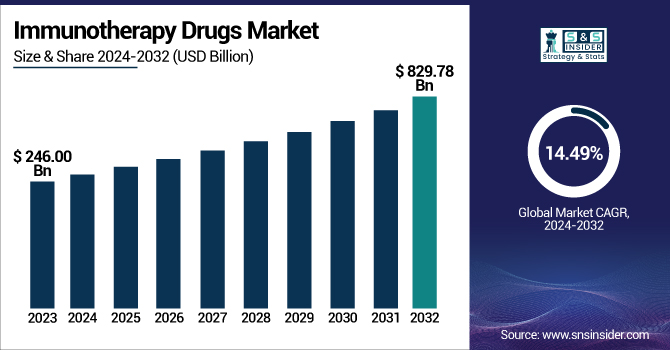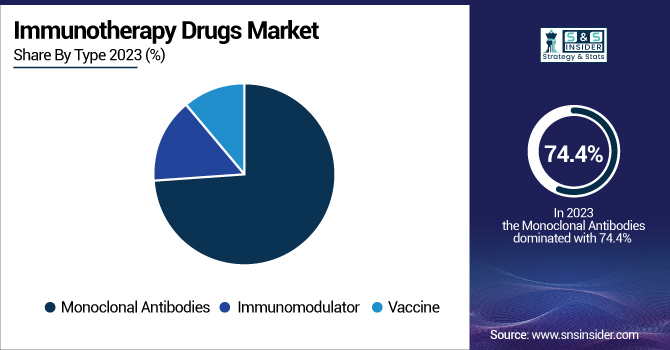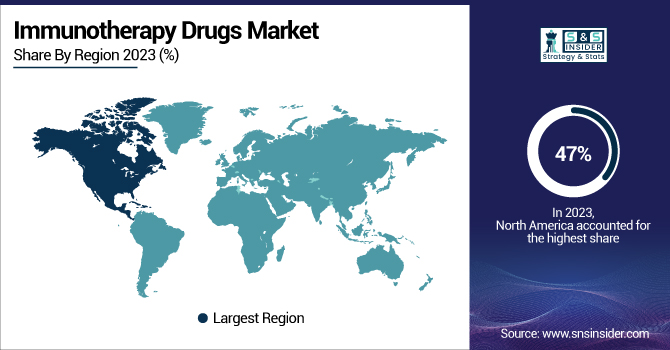Immunotherapy Drugs Market Overview:
The Immunotherapy Drugs Market was valued at USD 246.00 billion in 2023 and is expected to reach USD 829.78 billion by 2032, growing at a CAGR of 14.49% over the forecast period 2024-2032.

To Get more information on Immunotherapy Drugs Market - Request Free Sample Report
The immunotherapy drugs market is expanding rapidly due to the increasing incidence/prevalence of target disease conditions such as cancer, autoimmune diseases, and infectious diseases. A more than tripling in prescriptions of immunotherapy has been driven by greater awareness among doctors of the disease coupled with improved diagnosis capabilities and represents a move toward increasingly targeted treatment. Moreover, making monumental investments in immunotherapy research and development (R&D), the drug development pace is accelerated, and a well-established pipeline comprises newer-generation therapies, including immune checkpoint inhibitors, CAR-T cell therapies, monoclonal antibodies, and so on. Such efforts are streamlining treatment, maximizing patient benefit, and facilitating the use of immunotherapy in a variety of clinical environments.'
U.S. Immunotherapy Drugs Market Size & Forecast
The U.S. Immunotherapy Drugs Market was valued at USD 90.55 billion in 2023 and is expected to reach USD 292.56 billion by 2032, growing at a CAGR of 13.94 % over the forecast period 2024-2032.
Immunotherapy Drugs Market Dynamics
Key Drivers:
-
Rising Immunotherapy Demand Driven by Cancer Cases Personalized Medicine and Advancements in Combination Therapies
The increasing incidence of cancers, autoimmune diseases, and infectious diseases, among others, is a major driving force for the growing popularity of immunotherapy products. The other factors contributing to this growth include the rising adoption of personalized medicine focusing on targeted therapies. These efforts have further accelerated the development of new immunotherapies, such as CAR-T cell therapy and immune checkpoint inhibitors, which have improved treatment outcomes. This is also increasing the overall healthcare infrastructure, raising awareness about the benefits of immunotherapy, high adoption of favorable regulatory policies and others are some of the other factors supplementing the market growth. Additionally, the growing attention towards combination therapies is boosting the efficiencies of immunotherapy drugs, leading to the increased uptake of these therapeutics.
Restrain:
-
Immunotherapy Challenges Include Complex Administration Severe Side Effects and Limited Access in Low-Resource Areas
Immunotherapy treatments are generally complex and need to be administered and monitored by trained professionals. As a result, their implementation may be constrained in low-resource settings or in areas where trained personnel are lacking. Immunotherapy treatments can also have severe side effects, including cytokine release syndrome, immune-related adverse events, and an increased risk of infections, presenting issues in patient safety and treatment management. These may dissuade healthcare providers and patients from choosing immunotherapy even if it is beneficial.
Opportunity:
-
Immunotherapy Market Growth Driven by Innovation Expanded Applications and Strategic Industry Collaborations
The immunotherapy drugs market is one of the greater growing opportunities. Emerging research and development efforts to identify innovative immunotherapeutic agents are creating new opportunities for enhancing treatment. The increasing use of immunotherapy beyond the field of cancer into conditions such as respiratory, dermatological, and neurological indications represents a major opportunity for market expansion. Moreover, an increase in potential strategic collaborations between pharmaceutical companies and research institutions is stimulating the immunotherapy drugs development. This trend is expected to provide market players with the opportunity to expand their presence in emerging markets where the healthcare infrastructure is improving, allowing better access to under-served patient populations for longer-term growth potential.
Challenges:
-
Immunotherapy Development Faces Challenges in Trials Complex Research and Limited Predictive Biomarkers
The drug development process is also another long and uncertain journey. Because of their nature, these drugs must go through long clinical trials to yeast safety and efficacy, meaning delayed development times and potential regulation issues. Immunotherapy mechanisms are also complex requiring sophisticated research whereby no company has consistently been able to produce a successful therapeutic. In addition, several immunotherapies are not rationally employed because no valid predictive biomarkers are available in the clinical practice for some of these approaches. Together, these challenges limit patient access to these immunotherapy drugs, highlighting the need for continued innovations and more effective approaches to improve the benefit and accessibility of these drugs to patients.
Immunotherapy Drugs Market Segmentation Analysis
By Type
In 2023, monoclonal antibodies were the largest segment of the immunotherapy drugs market and held 74.4% of the total share. Their pervasive use in the treatment of different cancers, immune system disorders, and infectious diseases accounts for this dominance. Monoclonal antibodies can provide targeted treatment by specifically targeting cellular targets suffering from disease while limiting the effects on healthy tissues, making them more effective and better tolerated. This paved the way for their decade-plus history in oncology, further accelerating their market share as antibody engineering continues to improve.
From 2024-2032, the fastest-growing segment is expected to be the vaccines segment. The growth is attributed to rising investments in vaccine development, high preventive healthcare awareness, and innovative cancer vaccine development. The segment is expected to observe promising growth on account of the introduction of new immunization technologies and increasing clinical trials for therapeutic vaccines.

By Indication
In 2023, the cancer segment accounted for the majority of the immunotherapy drugs market share, at 88.3%. Such dominance can be attributed to the growing global prevalence of different types of cancers along with the successful role of immunotherapy in oncology. Immune checkpoint inhibitors, CAR-T cell therapies, and monoclonal antibodies: these therapies are changing the face of cancer care by extending lives and providing targeted approaches. The segment's dominance is also owing to continuous innovation and the introduction of new immunotherapies for various types of cancer and their recent approvals.
The infectious diseases segment is projected to witness the fastest growth from 2024 to 2032. Increasing investments in the development of immunotherapies for HIV, and hepatitis will drive this growth. Potential in confronting infectious diseases, together with enhancement in vaccine development and antibody therapies, fosters segment expansion during the forecast period.
Immunotherapy Drugs Market Regional Insights
The immunotherapy drugs market was led by North America with a share of 47% in 2023, primarily due to better healthcare infrastructure, greater R&D investments in the past few decades, and a stronger regulatory framework for immunotherapy products. Large pharma companies collaborating on developing and commercializing immunotherapies are driving this momentum for the region. Immune checkpoint inhibitors such as Opdivo ( nivolumab ) from Bristol-Myers Squibb and Keytruda ( pembrolizumab ) from Merck are some of the more widely known cancer Immunotherapeutics in use throughout North America. Furthermore, the usage of CAR-T cell therapies and expanding clinical trials also favor the region's growth in the market.
The Asia-Pacific region is expected to be the fastest-growing market throughout the forecast period from 2023 to 2032, owing to rising healthcare expenditures, a growing number of cancer cases, and increasing access to novel therapies. Much of the immunotherapy research is moving ahead in nations such as China, Japan, and India. As an example, the PD-1 inhibitor Toripalimab from Junshi Biosciences has recently started making an impact on the oncology space in China. In addition, partnerships between international pharma companies and local companies have also fostered rapid uptake of immunotherapy throughout Asia-Pacific. Such dynamic growth extends an attractive opportunity to the market to bolster its growth in the coming years.

Get Customized Report as per Your Business Requirement - Enquiry Now
Key players in the Immunotherapy Drugs Market
-
Bristol-Myers Squibb (Opdivo)
-
Merck & Co., Inc. (Keytruda)
-
Roche Holding AG (Tecentriq)
-
AstraZeneca (Imfinzi)
-
Pfizer Inc. (Bavencio)
-
Eli Lilly and Company (Cyramza)
-
Novartis AG (Kymriah)
-
Gilead Sciences, Inc. (Yescarta)
-
Johnson & Johnson (Darzalex)
-
Sanofi (Sarclisa)
-
Regeneron Pharmaceuticals, Inc. (Libtayo)
-
Amgen Inc. (Blincyto)
-
Takeda Pharmaceutical Company Limited (Adcetris)
-
Incyte Corporation (Opzelura)
-
Seagen Inc. (Padcev)
Recent Developments and Trends
-
In December 2024, AstraZeneca's Imfinzi was approved by the FDA as the first and only immunotherapy for patients with limited-stage small-cell lung cancer.
| Report Attributes | Details |
|---|---|
| Market Size in 2023 | USD 246.00 Billion |
| Market Size by 2032 | USD 829.78 Billion |
| CAGR | CAGR of 14.49% From 2024 to 2032 |
| Base Year | 2023 |
| Forecast Period | 2024-2032 |
| Historical Data | 2020-2022 |
| Report Scope & Coverage | Market Size, Segments Analysis, Competitive Landscape, Regional Analysis, DROC & SWOT Analysis, Forecast Outlook |
| Key Segments | • By Type (Monoclonal Antibodies, Immunomodulator, Vaccine) • By Indication (Cancer, Autoimmune Diseases, Infectious Diseases, Others) |
| Regional Analysis/Coverage | North America (US, Canada, Mexico), Europe (Eastern Europe [Poland, Romania, Hungary, Turkey, Rest of Eastern Europe] Western Europe] Germany, France, UK, Italy, Spain, Netherlands, Switzerland, Austria, Rest of Western Europe]), Asia Pacific (China, India, Japan, South Korea, Vietnam, Singapore, Australia, Rest of Asia Pacific), Middle East & Africa (Middle East [UAE, Egypt, Saudi Arabia, Qatar, Rest of Middle East], Africa [Nigeria, South Africa, Rest of Africa], Latin America (Brazil, Argentina, Colombia, Rest of Latin America) |
| Company Profiles | Bristol-Myers Squibb, Merck & Co., Inc., Roche Holding AG, AstraZeneca, Pfizer Inc., Eli Lilly and Company, Novartis AG, Gilead Sciences, Inc., Johnson & Johnson, Sanofi, Regeneron Pharmaceuticals, Inc., Amgen Inc., Takeda Pharmaceutical Company Limited, Incyte Corporation, Seagen Inc. |

